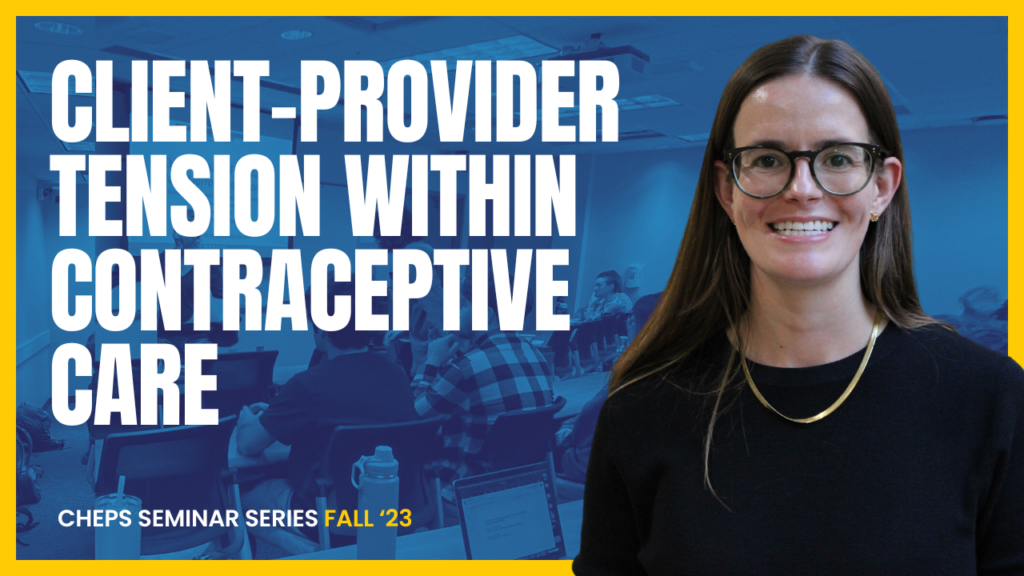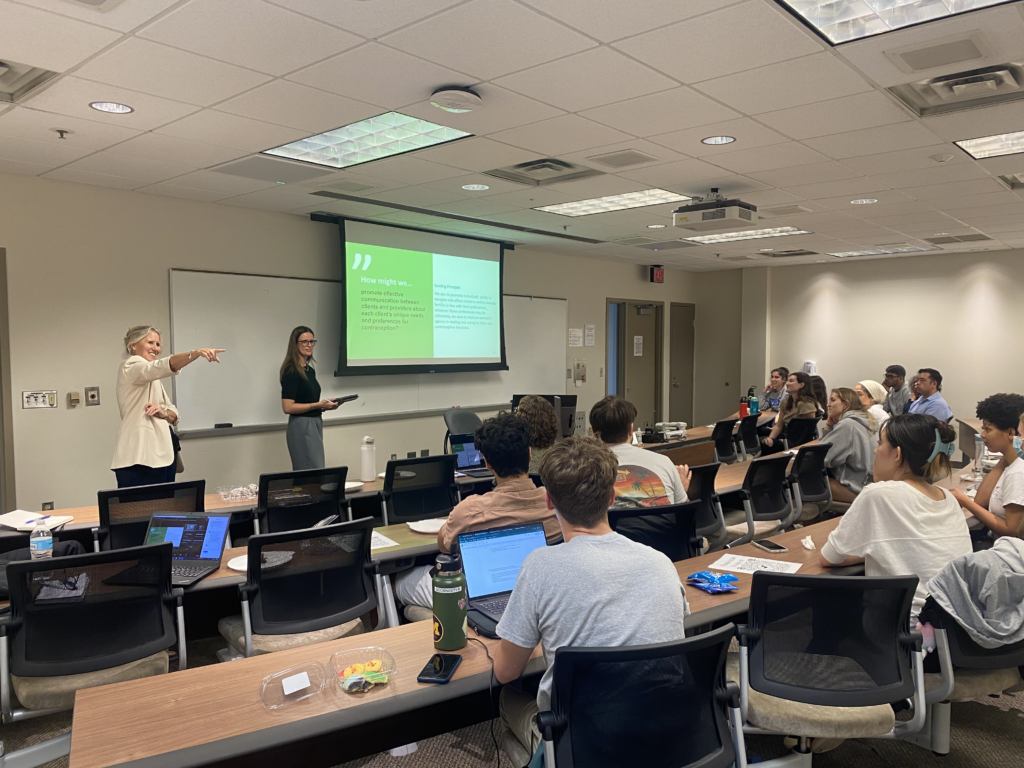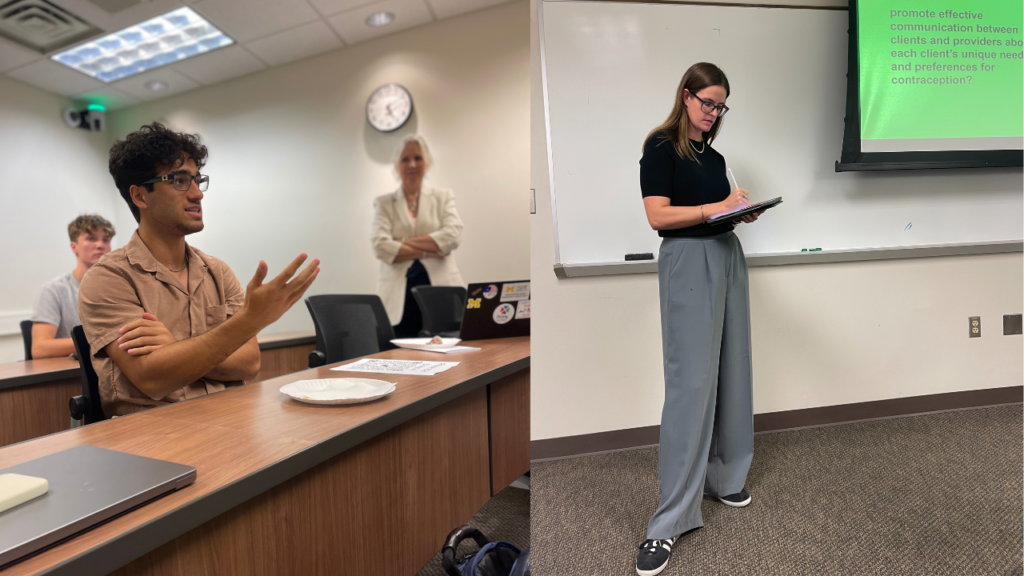
This week at the Providing Better Healthcare Through Systems Engineering seminar series, students, staff, faculty, clinicians, and community members gathered to discuss client-provider tension in contraceptive care for low-resource communities.
Julia Kramer, PhD, MPH is an Assistant Professor of Mechanical Engineering at the University of Michigan. In her research, she focuses on equity-oriented engineering solutions to modern healthcare issues. This Monday, Kramer presented an insightful seminar on human-centered design as it applies to her research promoting rights-based family planning for contraceptive care.
Contraceptive care and human-centered design
With a variety of contraceptive methods available, such as insertive IUDs, hormone injections, and oral contraceptives, it can be difficult for patients in low-resource communities to feel adequately informed and advised in their contraceptive healthcare journey. While providers are attempting to efficiently attend to their patients and “normalize” the common side effects of their care, many women have reported feeling underprepared, underrepresented, and misinformed in their health decisions.
While sharing her research of this dilemma in Kenya and Ethiopia, Kramer emphasized the design and evaluation implications of expanding “patient-centeredness” care to “person-centeredness” care. She provided some inspiring insight into the importance of socially-engaged patient care: “Human-centered design is an affirmation of human dignity.”

She described this “tension” as a fundamental discordance between what patients want and what providers are giving. There are many constraints on the provider side, like extensive patient lists, insufficient procedure training, and supply chain limits supporting certain procedures. As a result, some women feel like their medical autonomy is being undermined by the providers pipelining them towards certain methods and underrepresenting all of their options. The patients want as much information as they can to dissolve any confusion and fully understand their position in receiving contraceptive care. They want to be seen, heard, and treated as individuals by their doctors.
Kramer believes the solution lies in rights-based family planning and human-centered design. She seeks a system where rather than feeling neglected and generalized by doctors normalizing the side effects of contraceptive care, they can feel uplifted and listened to by their providers. Many are seeking more personalized care where they can speak openly about their individual needs and situation. Contraceptive care is an extremely personal and multifaceted field. Behind each patient lies a unique combination of familial privacy, resource accessibility, religious beliefs, and many other sociocultural factors.
Questions, clarifications, and creative brainstorming
Kramer emphasized the often-overlooked importance of creativity and out of the box thinking in developing healthcare solutions. The group asked many thoughtful questions to better understand the issue at hand and support their brainstorming session to come. The Q and A prompted an insightful discussion of the technology and infrastructure accessibility in the communities of interest, specific home-life concerns that a patient may have, and a description of what an appointment at one of these clinics looks like for a patient. Kramer also shared a general overview of the most common contraceptive methods available, as well as the side effects, timelines, and cultural implications that come along with each procedure.
After developing a more holistic understanding of the issue at hand, the group brainstormed some possible solutions to help relieve some of the patient-provider tension experienced in these areas. The ideas ranged from simple but effective strategies such as creating a paper questionnaire that patients can fill out to indicate what kinds of care they would like to discuss, to much broader systematic approaches such as recruiting community health workers to overcome staffing barriers and encouraging people with midwifery experience to share their experiences with patients seeking contraceptive care.
Marina Epelman, PhD, Associate Chair of U-M IOE’s Graduate Program and CHEPS Faculty Affiliate, suggested distributing information about contraceptive methods at postpartum appointments and other regular medical check-ins to increase patient accessibility and knowledge. One “flying monkey” (or wildly out-of-the-box idea) shared was to incentivize more women to enter this field by making education free for women. This evolved into some very real and plausible ideas to help resolve some identity bias on the provider side and help women become more empowered and encouraged to claim autonomy over their contraceptive healthcare journey.

Join us
Next week’s session will present another fascinating conversation as the Chief Information Officer of Michigan Medicine, Andrew Rosenberg, MD, discusses “The Challenges and Opportunities of Healthcare Optimization.” Join us on Mon. October 9th, from 4:30-6:00 PM in IOE 1680.
To RSVP to one or more sessions (or to request access to a session recording), please email [email protected].
— Written by Gabriel Ferriero, CHEPS Student
